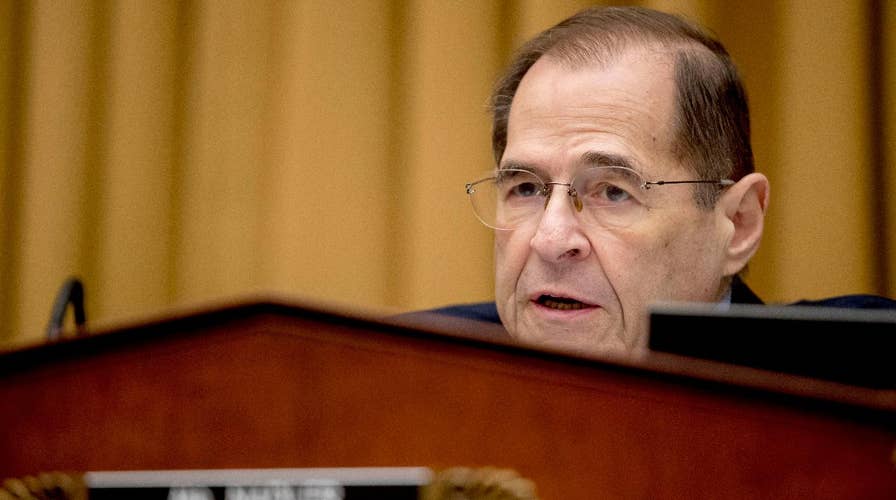Chairman of the House Judiciary Committee Rep. Nadler issues document demands to 81 people in Trump probe
Georgia Republican Rep. Doug Collins says the Democratic Party has been hijacked by ‘impeach-Trump forces’.
House Judiciary Committee Democrats are preparing to authorize subpoenas this week seeking Special Counsel Robert Mueller’s full report after the Justice Department indicated it will miss a Democrat-imposed deadline of April 2, in a major escalation of the battle between Congress and the administration over access to the underlying documents and evidence from the probe.
Last week, Attorney General Bill Barr announced that the Justice Department and the special counsel were “well along in the process of identifying and redacting” sensitive material in the more than 300-page report and would likely have it to Congress by mid-April, “if not sooner.”
DEMS WHO FUMED AT NUNES FOR JEOPARDIZING 'SOURCES AND METHODS' NOW DEMAND MUELLER REPORT IN FULL
But Monday, Judiciary Committee Chairman Jerrold Nadler, D-N.Y., announced that the panel will vote Wednesday to authorize the option of issuing subpoenas.
“As I have made clear, Congress requires the full and complete Special Counsel report, without redactions, as well as access to the underlying evidence,” Nadler said in a statement Monday. “Attorney General Barr has thus far indicated he will not meet the April 2 deadline set by myself and five other Committee chairs, and refused to work with us to provide the full report, without redactions, to Congress.”
Nadler added that Barr should “reconsider so that we can work together to ensure the maximum transparency of this important report to both Congress and the American people.”
“The full and complete report must be released to Congress without delay,” Nadler said.
The authorization of subpoenas does not mean the committee is issuing them, but rather gives Democrats on the panel the option to do so should they feel it necessary.
The Judiciary Committee cited “historical precedent” for the full release of the Mueller report—specifically Watergate, when a judge ordered a 55-page grand jury roadmap to be provided to the committee; and during the Ken Starr investigation of former President Bill Clinton, when a 455-page report along with evidence including grand jury material was provided to the panel.
Despite the firm demands from House Democrats, Barr has indicated he does plan on sharing much of the report itself, noting that, with the help of the special counsel’s office, the Justice Department is reviewing material that ““by law cannot be made public” -- covering “material the intelligence community identifies as potentially compromising sensitive sources and methods; material that could affect ongoing matters, including those that the Special Counsel has referred to other Department offices; and information that would unduly infringe on the personal privacy and reputational interests of peripheral third parties.”
Barr added that: “Although the President would have the right to assert privilege over certain parts of the report, he has stated publicly that he intends to defer to me and, accordingly, there are no plans to submit the report to the White House for privilege review."
Barr released his summary of Mueller's report last week, stating that the special counsel found no evidence of collusion between members of the Trump campaign and Russia during the 2016 presidential election. The special counsel was also reviewing whether the president had obstructed justice in any way, but ultimately did not come to a conclusion on that issue. Barr and Deputy Attorney General Rod Rosenstein, though, said the evidence was “not sufficient to establish that the President committed an obstruction-of-justice offense.”
The top Republican on the Judiciary Committee, Ranking Member Doug Collins, R-Ga., slammed the Democrats for "setting arbitrary deadlines," in a written statement:
“Judiciary Democrats have escalated from setting arbitrary deadlines to demanding unredacted material that Congress does not, in truth, require and that the law does not allow to be shared outside the Justice Department. It’s unfortunate that a body meant to uphold the law has grown so desperate that it’s patently misrepresenting the law, even as the attorney general has already demonstrated transparency above and beyond what is required.”
Meanwhile, Nadler's committee is also leading its own Trump-focused investigation, which was announced last month. Nadler and the Democrats said they are probing “alleged obstruction of justice, public corruption, and other abuses of power by President Trump." As part of that probe, Nadler has requested documents from 81 individuals and entities connected to the president.





